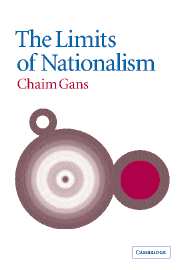Book contents
- Frontmatter
- Contents
- Acknowledgements
- Introduction
- 1 Nationalist ideologies – a normative typology
- 2 The liberal foundations of cultural nationalism
- 3 National self-determination
- 4 Historical rights and homelands
- 5 Nationalism and immigration
- 6 Nationalism, particularism and cosmopolitanism
- 7 Conclusion
- Bibliography
- Index
2 - The liberal foundations of cultural nationalism
Published online by Cambridge University Press: 22 September 2009
- Frontmatter
- Contents
- Acknowledgements
- Introduction
- 1 Nationalist ideologies – a normative typology
- 2 The liberal foundations of cultural nationalism
- 3 National self-determination
- 4 Historical rights and homelands
- 5 Nationalism and immigration
- 6 Nationalism, particularism and cosmopolitanism
- 7 Conclusion
- Bibliography
- Index
Summary
According to cultural nationalism, members of groups sharing a common history and culture have a fundamental, morally significant interest in adhering to their culture and in sustaining it for generations. It further maintains that this interest should be protected by states. I shall examine three theses included in this statement. The first, the adherence thesis, asserts that people have a basic interest in adhering to their national culture. The second thesis is historical. It concerns the basic interest people have in recognizing and protecting the multigenerational dimension of their culture. The third thesis, a political one, holds that the interests people have in living their lives within their culture and in sustaining this culture for generations should be protected politically. Some contemporary writers who support a liberal version of cultural nationalism do so by arguing that people have an interest in culture mainly because it is a prerequisite for their freedom and also because it is a component of their identity.
In the first part of this chapter I shall examine to what extent these arguments succeed in providing a foundation for the adherence thesis. Various critics have totally rejected the freedom-based argument as a possible basis for this thesis. After expressing some reservations concerning this total rejection of the freedom-based argument, I will discuss the identity-based argument at some length. I shall claim that this argument provides a basis for the adherence thesis independently of the freedom-based argument.
- Type
- Chapter
- Information
- The Limits of Nationalism , pp. 39 - 66Publisher: Cambridge University PressPrint publication year: 2003



